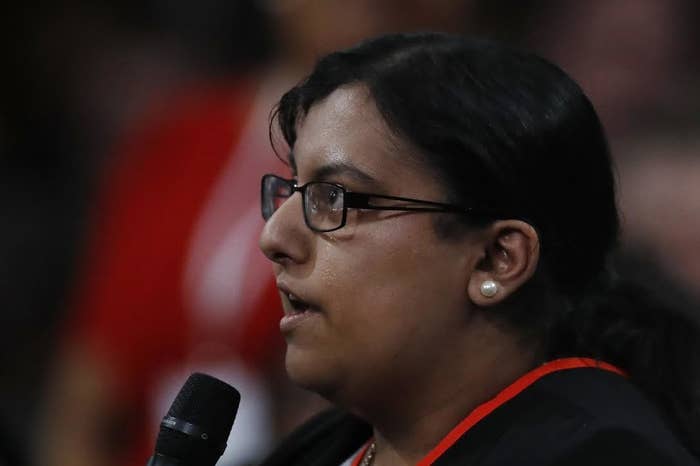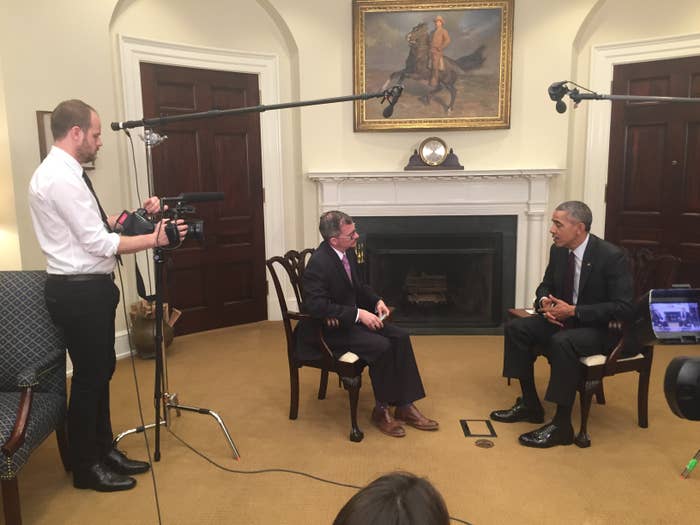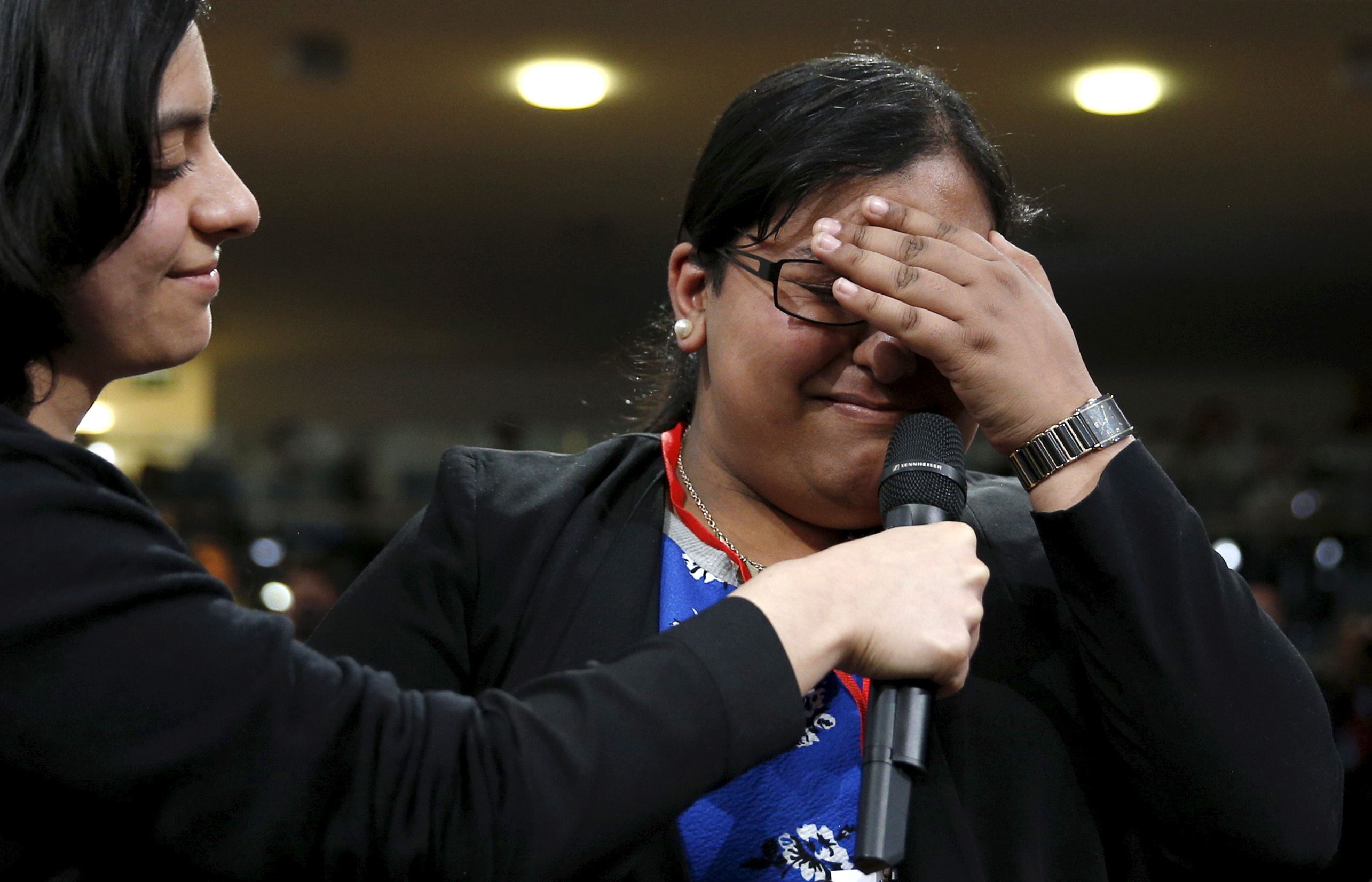
A British student who made headlines around the world after coming out to Barack Obama as nonbinary is urging the UK government to improve "oversubscribed and overburdened" gender identity clinics and introduce an "X" indicating a nonbinary legal gender category on British passports.
Maria Munir, 20, a politics and international relations student from Watford, told BuzzFeed News: "The requirements for referral or [gender dysphoria] treatment are very outdated as it requires medical evidence that you've been living in that gender.
"Yet for a nonbinary person there probably is nothing medically wrong to make them nonbinary. It's very outdated and presumptuous."
Munir, who uses the pronoun "they" and identifies as nonbinary – a term used to describe people who do not identify as male or female – said the next step in their advocacy work was to campaign for the definition of nonbinary to be introduced into the Equality Act.
"I think that's the next step as you can't provide for someone whose identity is not recognised," Munir said. "It's very difficult, if there's no definition, to enforce equality in workplaces to ensure there's no discrimination, so first the government has to recognise nonbinary people."
The student's calls add to a chorus of voices that have said the government and health service are letting down transgender people, including findings from a report published by the women and equalities committee early this year.
Munir also called for the introduction of an "X", indicating a nonbinary legal gender category, on British passports – following countries such as Nepal, New Zealand, and Australia. "There is an issue of documentation, so if you're nonbinary it is very difficult to get any ID to reflect that," Munir said.
This month 100 MPs signed a parliamentary early day motion calling for the non-gender-specific "X" passports. Norman Lamb, the senior Lib Dem who tabled the motion, said: "Reaching this milestone shows the strength of support for the rights of nongendered people.
“This is a simple fight of equality. There is no reason why gender should be specified on a passport, and to force people to choose between two binaries is discriminatory and archaic."
Munir, who studies at the University of York and identifies as a British Pakistani Muslim, said their faith does not conflict with their campaigning for nonbinary rights and part of their culture is "to facilitate inclusion".
"While there may be individuals in my community who disagree with the nature of people as they are, we have to accept that everyone has the chance to live their life as they wish, and that we shouldn't be forcing anyone to adhere to our own strict conclusions to what we believe humanity to be," Munir said.
"So I feel that as a Pakistani Muslim it's really important for me to help empower other people, especially in an age where one can feel pressured to hide their identity for fear of persecution. So I think it's important to use that as an asset rather than detract from the campaign."
Last month, Munir made headlines when they challenged the US president about "bathroom bill" legislation that in some states forces people to use toilets that correspond with the gender on their birth certificate. “What could you do to go beyond what is accepted as the LGBTQ rights movement including people who are outside the social norms?” Munir asked Obama at the time.
And Munir said they were "elated" to learn the US president's administration had later sent guidelines to public schools around the country telling officials they could not discriminate against transgender students.
"I was definitely elated," they said. "Because when I spoke to Obama on 23 April, he had been very assertive that while he completely challenged the discriminatory pieces of legislation in states like North Carolina, he was adamant there was a limit to what he could do, due to the problem of federal vs state laws.
"I was pleasantly surprised that he had issued this sweeping guidance for public schools in America, and I actually think it's indicative to challenge the norm in the US where the White House just has to let states do their own thing," Munir said, referring to state laws being passed around the country that were banning transgender people from using bathrooms in line with their gender identity.
After US schools were advised that pupils should be allowed to use public bathrooms and locker rooms that correspond to their gender identity, Obama said in an interview with BuzzFeed News earlier this week: "We're talking about kids. And anybody who's been in a school, in a high school, who's been a parent, I think should realise that kids who are sometimes in the minority, kids who have a different sexual orientation or are transgender, are subject to a lot of bullying."

"They are vulnerable," Obama said, "and I think that is part of our obligation as a society to make sure that everybody is treated fairly, and our kids are loved, and protected, and their dignity is affirmed."
When asked whether they had helped bring about the transgender rights guidelines, Munir said: "I felt like I had a very, very minor role to play, in that I expedited what I think would have happened eventually, by challenging Obama at a pivotal moment at one of his last days at the UK as president of the USA. But [by] getting the world media to draw its attention to the issue I think I've helped in my own way to pile on the pressure on the White House. But I do think it's because of the brilliant activists from the USA and all around the world working hard on this issue."

Speaking about the discrimination nonbinary and transgender people faced when using toilets, Munir, who hopes to study international human rights law in the future, said: "Gender neutral toilets can be provided in a building alongside the traditional disabled, men's and women's toilets if that's more accessible, but the reason why gender neutral toilets are needed because the people who go into men's or women's bathroom and face discrimination because of the way they look, then at least there is an option for them to access the basic human right for sanitation and helps ensure people don't have to come out if they're not ready to."
They added: "I feel disgusted frankly to think someone is so bothered about someone's genitals that they have to essentially inspect them and decide where they go, if anything it's draconian and completely illiberal."
"I think it's important to remember bringing in gender neutral toilets doesn't mean everybody has to become gender neutral. Because that's not how it works."
